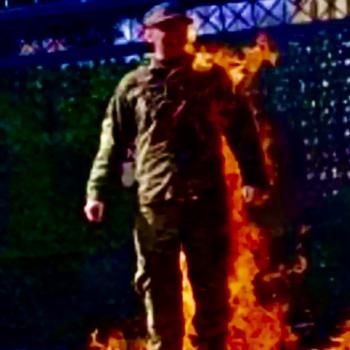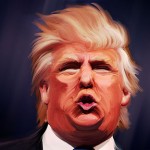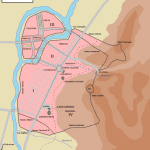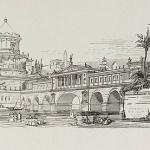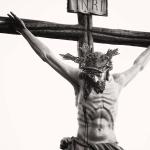My first faculty position was at Wabash College in 2010 where I took my brand new Ph.D. and my online battletested Catholic politics into a lively intellectual fray. My late and dear friend, Steve Webb, was a ready and willing opponent: a personal friend of Neuhaus and member of the circle of writers at First Things. He and I wrote and spoke against each other politically for two years, ending in a packed debate on Catholic Social Teaching.
The conservative student publication The Commentary was infamous among my mostly liberal colleagues, but the students there were our very best, mostly majors in classics and philosophy, and between them and the Newman Center I had a ready audience for trying out what were quite new ideas. They forced me to become familiar with the more classically conservative literature as well: Hayek, Kirk, and more.
I also formed a deep friendship with the Malcolm X Institute for Black Studies and there I shared and gained more understanding of the Black intellectual tradition. I resisted liberal multiculturalism and gave a talk inspired by Malcolm X, “White History Month,” during Black History Month. The students there were also generous and intellectually curious there and they honored me with an honorary membership.
My political opposition to Webb made me play the leftist part, but Webb understood the deeply conservative roots of many of my arguments and my refusal to play identity politics in the real politik of the institution—for which, in part, I was unable to stay. By the end of my time at Wabash, I felt that I had managed to articulate and defend a worldview that was metaphysically and politically consistent and worthwhile, rooted in my faith, but also critical of it in its contemporary manifestations in the American church.
I left Vox Nova feeling that the blog had become too politically affected by the left, which to this day I find hard to handle as a social disposition—I’d sooner drink with a neo-con or a Marxist than a liberal altruist. My ongoing reading and teaching of Ivan Illich surely had something to do with this social disposition.
•••
My first tenure track job was at the University North Dakota where I don’t feel that I changed much politically. I began writing at Patheos and experimenting there with a more abrasive but also more popular and accessible style of writing. I learned a lot about real world politics by taking careful note of the ideological paradoxes of the local State’s compromise between agrarian libertarianism, which often led to a more communitarian approach, and cultural conservatism, which was fiercely individualistic.
At Patheos I joined Mark Shea who had been to our ideological right at Vox Nova when I began writing and Patheos Catholic editor Elizabeth Scalia offered me and my hodgepodge of ideas a warm welcome and carte blanche. I felt at home writing there–I hope that today I able to keep the house she built somewhat functional as its new editor and, now, relapsed blogger.
The election of Francis was uplifting in many ways, but it was also something of a let down, for selfish reasons. I had invested an enormous amount of time in showing how American conservatism in the US Catholic Church was inconsistent with the teaching of the past two popes whom conservatives often considered to be their champions: John Paul II and Benedict XVI. With Francis there seemed to be a selective amnesia of the ways in which the shock of his message was much more related to the previous two popes—not to mention the whole of Catholic tradition. I chaffed a bit at this, but I also had to resist becoming too smug or self-assured about it all.
During this time I was mostly disenchanted with my academic work at UND. I found the community and faculty there, with a few notable exceptions, to be anti-intellectual and philistine. I watched a lot of Amazon Prime, including the entire archive of William F. Buckley Firing Line episodes. I was impressed by his manner, style, and occasional grace. It was my way of coping with the 2012 election, which I refused to walk a block’s distance to participate in.
I was now publishing at several venues online and my academic publishing was moving along as well, and with a new job ahead at the University of British Columbia, I left blogging behind to focus and also out of a sense that my voice was no longer improving or needed.
•••
I was hired at UBC partly, I am told, for my theological interests in philosophy of education. In the secular university life of my field and department, I’ve only found an enormous respect and even enthusiasm for my Catholicism. A colleague and friend was quick to describe me as “something of a Catholic anarchist.”
Since being in Vancouver, I’ve found a local church community that in some ways is the usual fare that I’m used to, but also with its own differences, unique to a Canadian political climate that is quite different from the USA and a Catholic Church that is truly experiencing Taylor’s Secular Age. I’ve been able to refine my ideas and critiques and also be more constructive in how I tailor them and what their implications might be. I like to think I’ve softened on some of my more embittered distinctions.
The rise of Trump was something I wrote about satirically in 2011, but this time around it has radicalized many of my views, providing strong confirmation of earlier intuitions and speculative claims that had little to no support at the time. I recently read and heard his nomination acceptance speech that was praised by single issue voting pro-life Catholic conservatives although it said absolutely nothing about their so-called “single issue.” This past weekend a Trump supporter took to calling me a wetback and suggested I go back to Mexico.
Trump has also revealed a deep pocket of conservatives whose principles led them to reject the glamour of Trump’s rise to power in the GOP from the get-go. People like Robert George have shown me that the intellectual integrity of American conservatism is not all lost. Many of these people I am lucky to count as friends and, while our politics are wildly different, we are able to recognize a common toxicity in Trump (regardless of what we think should be done about it).
I’ve left American right-wing conservatism of a certain kind behind, with all its promises and ambitions and moral majorities, but I’ve found its intellectual heritage essential for my exit. I’ve embraced some basic principles of the vague collectivist left, but not on leftist terms. Often those terms have come through Catholic Social Teaching and the anthropology of a broad Christian humanism. I realize that these labels matter for many things, but I hope that the relationships and people that anchor so many of the beliefs and convictions are the true measure of my political vision today.
I’ve seen my conscience formed by a long line of people, some by total accident, some on purpose, all of them by the grace of God. I consider myself fortunate to neither feel consoled by a quiet false consciousness of certainty nor suffer from a total skepticism of my own weighty conscience. In some things I feel I have made some sense of a politics that at least has some theoretical integrity; in most things I find my systems and concepts deeply challenged by my gut reactions that remain in a state very close, if not identical, to that eight-year-old boy watching The Alamo. Come and get it.
•••
Whatever education might be, I believe it must consist in allowing a person to see into the very constitution of their conscious soul and mind and stare at that recipe and technique and judge themselves before their own naked eye. The colors and hues that glow and blur that vision are not all bad, but when the eye itself has no sight, when the light is gone because it comes from niche news and media conspiracy and books that are not books—when this deadness of intellect and heart occurs, there is no politics there. Only issues with no ideas: rotten overripe flesh leather, void of blood or spirit.
There is nothing there but nothing.
To those who can, write out your life, see it in the truth of your memory and confession, offer it as testimony. To those who cannot, seek the light, wipe away your scales and fear, find your sight in the one who is all face, all eye, all light.
Amen.






